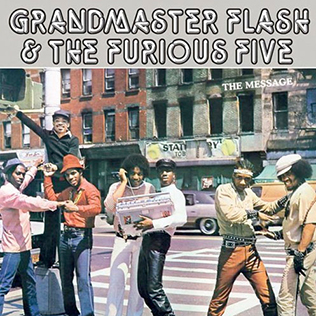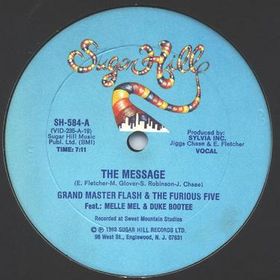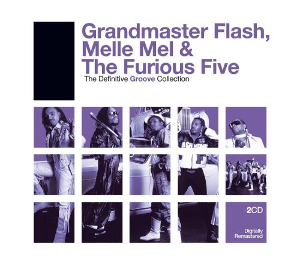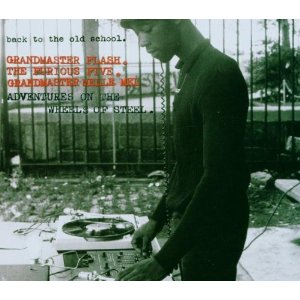Related Research Articles
Old-school hip hop is the earliest commercially recorded hip hop music and original style of the genre. It typically refers to the music created around 1979 to 1983, as well as any hip hop that does not adhere to contemporary styles.

Melvin Glover, better known by his stage name Grandmaster Melle Mel, is an American rapper who was the lead vocalist and songwriter of Grandmaster Flash and the Furious Five.
Clifton "Jiggs" Chase is an American jazz-funk organ player, composer, and influential record producer from New Jersey, United States. One of the earliest known recordings is his organ playing on the 1967 Buddy Terry recording Natural Soul, alongside Woody Shaw.

Grandmaster Flash and the Furious Five were an American hip hop group formed in the South Bronx of New York City in 1978. The group's members were Grandmaster Flash, Melle Mel, Kidd Creole, Keef Cowboy, Scorpio, and Rahiem. The group's use of turntablism, breakbeat DJing, and conscious lyricism were significant in the early development of hip hop music.

The Message is the debut studio album of American hip hop group Grandmaster Flash and the Furious Five, released on October 3, 1982 by Sugar Hill Records. It features the influential title track and hip-hop single "The Message".

"The Message" is a song by Grandmaster Flash and the Furious Five. It was released as a single by Sugar Hill Records on July 1, 1982, and was later featured on the group's debut studio album of the same name.

"White Lines (Don't Don't Do It)" is a song by American hip hop recording artist Melle Mel, released as a 12" in 1983 on Sugar Hill Records. The song, which warns against the dangers of cocaine, addiction, and drug smuggling, is one of Mel's signature tracks. The bassline is taken from a performance of the Sugar Hill house band (featuring bassist Doug Wimbish) covering "Cavern", a single by New York City band Liquid Liquid.

On the Strength is the second and final studio album by Grandmaster Flash and the Furious Five. Released in 1988, it was the full line-up's last album together. Although certainly contributing to the album itself, Cowboy was not present for the album or single photo shoots.

"The Adventures of Grandmaster Flash on the Wheels of Steel" is a single released by American disc jockey Grandmaster Flash in 1981. It is a live DJ mix recording of Flash scratching and mixing records from various groups using three turntables. The musician employed several DJ techniques in the recording, including crossfading, cutting, rubbing and backspins.

Greatest Messages is a compilation album release by Grandmaster Flash & the Furious Five. It was released in January 1984, and it is a compilation of their Sugar Hill Records hit singles including "The Message". Over half of the tracks were single-only releases prior to this compilation. Singles from Melle Mel are also on this compilation.

Joseph Robert Saddler, popularly known by his stage name Grandmaster Flash, is an American DJ and producer. He created a DJ technique called the Quick Mix Theory. This technique serviced the break-dancer and the rapper by elongating the drum breaks through the use of duplicate copies of vinyl. This technique gave birth to cutting, scratching. It also gave rappers better music with a seamless elongated bed of beats to speak on. He also invented the slipmat.

Grandmaster Flash, Melle Mel and the Furious Five: The Definitive Groove Collection is a double CD compilation album by Grandmaster Flash and the Furious Five released in 2006 on Rhino Records. It contains original full-length tracks by the various versions of both Grandmaster Flash and Grandmaster Melle Mel.

Adventures on the Wheels of Steel is a 3CD compilation album by Grandmaster Flash and the Furious Five and Grandmaster Melle Mel. It was released in 1999 on the Castle Music label and is a boxed set containing three CDs in slimline jewel cases together with a fold out insert.

Grandmaster Melle Mel and the Furious Five was released in 1984 by Sugarhill Records after the split between Grandmaster Flash and Melle Mel. For this album, Melle Mel kept the group name 'the Furious Five' and used the title 'Grandmaster'. Rappers Cowboy and Scorpio left with Melle Mel although Mel's brother The Kidd Creole and Rahiem remained with Flash. New rappers King Lou, Kami Kaze, and Tommy Gunn joined, as did Flash's best friend E. Z. Mike as DJ.

Essential Cuts is a budget compilation album by Grandmaster Flash and the Furious Five released on CD in 2005. Although titled to Grandmaster Flash alone, it does not contain any tracks from Flash's later Elektra Records albums and mainly features tracks from The Message era.
Edward Gernel Fletcher, known by his stage name Duke Bootee was an American early record producer and rapper.

The Essential is a 2CD slipcased compilation album by Grandmaster Flash and the Furious Five. It was released in 2007 on the Union Square Music label. Although titled to Grandmaster Flash alone, it does not contain any tracks from Flash's later Elektra Records albums and mainly features tracks from The Message era and subsequent singles. The eight-page booklet contains a brief October 2006 essay by Quinton Scott and features pictures of Flash from the photo session originally used for his Essential Mix: Classic Edition album.
Robert Keith Wiggins, known by his stage names Keef Cowboy and Cowboy was an American hip hop recording artist and a member of Grandmaster Flash and the Furious Five. He is widely credited as having invented the term "hip hop".
The following is a list of albums released by now-defunct hip-hop record label Sugar Hill Records.

The Sugar Hill Records Story is a 1997 compilation album compiling singles released by the Sugar Hill Records label. It was released by Rhino Records who had purchased the North American rights to the labels catalogue in 1995. On its release, it received positive reviews from Vibe, Spin and AllMusic.
References
- ↑ Christgau, Robert. "Grandmaster Melle Mel and the Furious Five [extended]". The Village Voice . Retrieved February 28, 2018.
- ↑ 'Message From Beat Street' liner notes.
- ↑ "Melle Mel - The Mega-Melle Mix (Vinyl) at Discogs". Discogs.com. Retrieved 2012-01-11.
- ↑ "Grandmaster Flash & The Furious Five - The Birthday Party at Discogs". Discogs.com. Retrieved 2012-01-11.
- ↑ "Furious Five, The Meets Sugarhill Gang, The* - Showdown (Vinyl) at Discogs". Discogs.com. Retrieved 2012-01-11.
- ↑ "Grandmaster Flash & The Furious Five - It's Nasty (Genius Of Love) at Discogs". Discogs.com. Retrieved 2012-01-11.
- ↑ "Grandmaster Flash & The Furious Five - The Message (Vinyl) at Discogs". Discogs.com. Retrieved 2012-01-11.
- ↑ "Melle Mel & Duke Bootee - Message II (Survival) (Vinyl) at Discogs". Discogs.com. Retrieved 2012-01-11.
- ↑ "Grand Master Flash & The Furious Five* - New York New York at Discogs". Discogs.com. 2011-09-07. Retrieved 2012-01-11.
- ↑ "Grandmaster & Melle Mel* - White Lines (Don't Don't Do It) at Discogs". Discogs.com. Retrieved 2012-01-11.